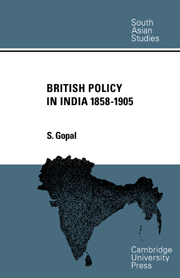Book contents
- Frontmatter
- Contents
- Preface
- Map 1 The Annexation of Burma
- Map 2 Afghanistan and Central Asia
- 1 The Aftermath of The Revolt, 1858–69
- 2 The Conservative Adventure, 1869–80
- 3 The Liberal Experiment—Ripon and Dufferin
- 4 Return to Caution, 1888–98
- 5 Curzon: The Apogee of Administration
- Conclusion
- Notes
- Bibliography
- Index
- Frontmatter
- Contents
- Preface
- Map 1 The Annexation of Burma
- Map 2 Afghanistan and Central Asia
- 1 The Aftermath of The Revolt, 1858–69
- 2 The Conservative Adventure, 1869–80
- 3 The Liberal Experiment—Ripon and Dufferin
- 4 Return to Caution, 1888–98
- 5 Curzon: The Apogee of Administration
- Conclusion
- Notes
- Bibliography
- Index
Summary
This survey of British policy in India after 1858 enables recognition of the principles and achievements which dominate the detail. At the start, neither the Conservatives nor the Liberals had any clear ideas about India. The statute of 1858 providing for the administration of the country and the Royal Proclamation stating the intentions of British rule were the responsibility of a Conservative Government; but there was nothing in them which could be said particularly to reflect Conservative ideals. The India Act was Disraeli's second attempt—the first having been laughed out—to provide for India nothing more than a system of government which would be acceptable to Parliament; it did not incorporate any ideas as to policy. The Proclamation, as finally issued, was inspired more by the Queen than by the government. She returned the first draft and asked Lord Derby to rewrite it, ‘bearing in mind that it is a female sovereign who speaks to more than a hundred million of Eastern people’. A reference to British power to undermine Indian religions and customs was replaced by her with a promise of religious toleration; and it was at the instance of the Governor-General, Canning, that a general amnesty was announced.
The impact of the Liberals on the new administration of India did not, however, extend much further. Canning had been a Peelite and was a close friend of Gladstone; but in India after 1858 he formulated policies which were more akin to Conservative attitudes.
- Type
- Chapter
- Information
- British Policy in India 1858-1905 , pp. 299 - 304Publisher: Cambridge University PressPrint publication year: 1965

